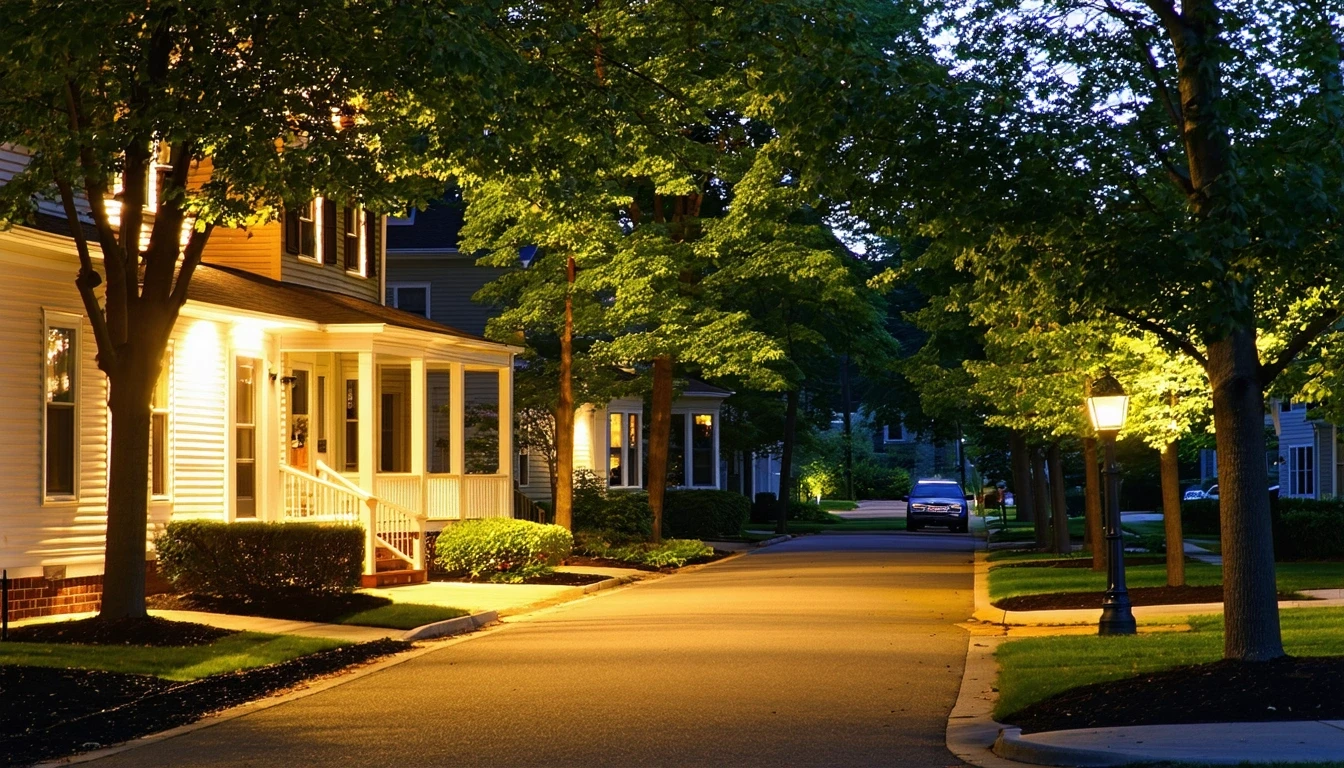Mclean, VA vs. Bethesda, MD: Cost of Living Comparison (2025)
For those considering a move to the Washington D.C. metro area, the choice often comes down to two popular suburbs: Mclean, Virginia and Bethesda, Maryland. While both offer a high quality of life with easy access to the nation’s capital, there are notable differences in cost of living that can sway the decision, especially for families and young professionals.
In 2025, the median home price in Mclean is projected to be around $1.2 million, while Bethesda’s median sits at $950,000. This gap of $250,000 is a significant factor for homebuyers to weigh, but it’s just one piece of the overall cost puzzle. Let’s dive into a full comparison of living costs in Mclean versus Bethesda to see which city offers the best value for your lifestyle and budget.

—
Housing Costs: Mclean Has Higher Prices but More Space
Housing is the biggest expense for most households, and the difference between Mclean and Bethesda is substantial. The typical rent for a 2-bedroom apartment in Mclean ranges from $2,400 to $3,000 per month, while similar units in Bethesda go for $2,100 to $2,600. For a 3-bedroom single-family home, Mclean’s median price of $1.2 million translates to a monthly mortgage payment around $5,500, assuming a 30-year fixed rate and 20% down. In Bethesda, the $950,000 median means a payment closer to $4,300 per month.
However, these averages don’t tell the full story. Mclean tends to have larger lot sizes and more spacious homes, appealing to families who need room to grow. Bethesda offers more compact housing with better walkability, suiting young professionals and empty nesters. Both cities have a mix of older homes and new construction, but Mclean has seen a wave of luxury builds in recent years, pushing up prices at the high end.
| Housing Type | Mclean | Bethesda |
|---|---|---|
| 2BR Apartment Rent | $2,400 – $3,000 | $2,100 – $2,600 |
| 3BR Home Median Price | $1,200,000 | $950,000 |
| 3BR Mortgage Payment* | $5,500 | $4,300 |
*Assumes 30-year fixed mortgage with 20% down payment and 3.5% interest rate.
For a family of four, the extra space in Mclean could be worth the higher housing cost. But a couple or single professional may prefer Bethesda’s lower prices and urban conveniences. Rental availability also tends to be higher in Bethesda, with apartments making up a larger share of the housing stock compared to Mclean’s ownership-heavy market.
Overall, budget-conscious households will find more affordable options in Bethesda, while those prioritizing square footage and suburban amenities lean toward Mclean. But with a difference of $1,200 or more in monthly housing costs, Bethesda gets the edge on affordability.
Utility Bills Are Similar, With Perks for Newer Homes
Utility costs don’t vary drastically between Mclean and Bethesda, as both cities have similar climates and energy prices. The average monthly utility bill for a 2-bedroom apartment ranges from $180 to $220 in Mclean and $170 to $210 in Bethesda, including electricity, gas, water, and trash service.
For single-family homes, utility costs can vary more based on the age and size of the property. Newer construction tends to have better insulation and energy-efficient features, which can lead to savings of $50 or more per month compared to older homes. With Mclean’s recent luxury building boom, homeowners may see slightly lower utility bills than in Bethesda’s more established neighborhoods.
Both cities experience cold winters and hot summers, so heating and cooling make up a large portion of energy usage. Many homes in the area rely on natural gas for heat, which tends to be less expensive than electric. Residents can also take advantage of energy-saving programs like off-peak pricing to lower their bills.
Since utility costs are broadly similar, with only minor differences based on home age and efficiency, this category is essentially a tie between Mclean and Bethesda. Residents of both cities can expect to budget around $200 per month for apartment utilities, with homeowners spending closer to $300-$400 depending on property characteristics.
Groceries and Dining Out Cost More in Bethesda

For groceries and everyday expenses, Bethesda tends to have slightly higher prices than Mclean. A gallon of milk averages $4.50 in Bethesda compared to $4.25 in Mclean, while a dozen eggs cost $3.80 versus $3.60. These small differences add up over time, especially for larger households.
Dining out is also pricier in Bethesda, with the average meal at a mid-range restaurant costing $70 for two people, compared to $60 in Mclean. However, Bethesda does offer a wider variety of cuisine options and locally-owned eateries, which some residents may value over cost savings.
Bethesda’s higher grocery and restaurant prices likely stem from its denser, more walkable layout, which supports a greater number of small businesses with higher overhead costs. Mclean’s larger supermarkets and chain restaurants can often provide lower prices due to economies of scale.
For a family of four, grocery and dining costs in Bethesda could easily exceed those in Mclean by $200 or more per month. Singles and couples may see a smaller impact, but those who cook at home frequently will spend less in Mclean. With lower prices across the board, Mclean wins this category for affordability.
Taxes and Fees Favor Mclean for Homeowners
While Virginia and Maryland have similar statewide tax rates, there are some notable differences at the local level that impact Mclean and Bethesda. Virginia’s property tax rates tend to be lower, with Mclean homeowners paying an average of 1.1% of their assessed value annually compared to 1.3% in Bethesda.
For a median-priced home, this means annual property taxes of $13,200 in Mclean versus $12,350 in Bethesda. However, Mclean’s higher home values mean a typical homeowner will still pay more in absolute terms. Renters are not directly impacted by property taxes, but landlords may pass on some of the cost through higher rents.
Both cities have additional fees for services like trash collection and water, but Mclean’s tend to be slightly lower. Most Mclean neighborhoods also have homeowners associations (HOAs) that cover services like snow removal and landscaping, which can save residents money compared to hiring private contractors.
Sales tax is 6% in both Virginia and Maryland, so there’s no significant difference for everyday purchases. However, Maryland does have a local income tax of 3.2% on top of the state rate, while Virginia has no local income tax. For high earners, this can make a noticeable difference in take-home pay.
Overall, Mclean has the edge on taxes and fees, particularly for homeowners who can benefit from lower property tax rates and HOA perks. Renters and lower-income residents may see less of a difference, but Mclean still comes out ahead for most households.
Mclean Offers Lower Monthly Costs Across the Board
| Cost Category | Mclean | Bethesda |
|---|---|---|
| Housing (3BR Mortgage) | $5,500 | $4,300 |
| Utilities | $350 | $375 |
| Groceries | $800 | $900 |
| Transportation | $200 | $150 |
| Taxes | $1,100 | $1,225 |
| Misc. | $500 | $550 |
| Estimated Monthly Total | $8,450 | $7,500 |
Estimates reflect 2025 costs for a mid-size household (2-bedroom apartment or 3-bedroom home) using published national data and regional benchmarks. Actual expenses will vary with household size, lifestyle, and neighborhood.
When all major cost categories are considered, Mclean comes out ahead of Bethesda for overall affordability. For a typical family of four in a 3-bedroom home, monthly expenses total around $8,450 in Mclean compared to $7,500 in Bethesda, a difference of nearly $1,000.
However, these totals don’t account for income differences between the two cities. Mclean’s median household income is $190,000, about 20% higher than Bethesda’s $158,000. So while costs are lower in Mclean, residents also tend to have more disposable income to cover expenses.
Lifestyle Factors to Consider Beyond Cost
While cost is a key consideration, it’s not the only factor in choosing between Mclean and Bethesda. Each city offers a distinct lifestyle that may sway the decision for some households.
Mclean is known for its excellent public schools, spacious homes, and quiet suburban feel. It’s a popular choice for families who value top-notch education and a close-knit community. The tradeoff is longer commute times into D.C., with most residents relying on cars rather than public transit.
Bethesda, on the other hand, offers a more urban environment with greater walkability and access to amenities. It has a lively downtown area with plenty of shops, restaurants, and entertainment options. The Metro Red Line runs through Bethesda, providing easy access to D.C. for commuters.
These lifestyle differences can indirectly impact cost of living. For example, Mclean residents may spend more on transportation due to longer commutes and higher car ownership rates. Bethesda residents may have lower entertainment costs thanks to free public events and discounts at local businesses.
Ultimately, the choice between Mclean and Bethesda depends on individual priorities and preferences. Families who value space and schools may prefer Mclean, while singles and couples who prioritize convenience and urban amenities may lean toward Bethesda. Remote workers can benefit from Mclean’s lower costs without sacrificing lifestyle.
Frequently Asked Questions
Is Mclean more affordable than Bethesda in 2025?
Yes, Mclean has lower costs across most major categories, including housing, groceries, and taxes. For a typical family, monthly expenses are nearly $1,000 lower in Mclean.
Are rental prices lower in Mclean or Bethesda?
Rental prices are generally lower in Bethesda, with a typical 2-bedroom apartment costing $300 to $400 less per month than in Mclean. However, Mclean offers more spacious rentals for the price.
How do grocery costs compare between Mclean and Bethesda?
Grocery prices are slightly lower in Mclean, with staples like milk and eggs costing 5-10% less than in Bethesda. For a family of four, this can add up to hundreds of dollars in savings per year.
Are property taxes higher in Bethesda than in Mclean?
Yes, Bethesda’s property tax rate of 1.3% is higher than Mclean’s 1.1%. However, Mclean’s higher home values mean the typical homeowner still pays more in absolute terms.
What is the average monthly cost of living for a family of four in Mclean vs. Bethesda?
For a family of four in a 3-bedroom home, monthly expenses average $8,450 in Mclean and $7,500 in Bethesda as of 2025. This includes housing, utilities, groceries, transportation, taxes, and miscellaneous costs.
The Bottom Line: Mclean Wins on Cost, But Lifestyle Matters
In the battle of Mclean versus Bethesda, Mclean comes out ahead for affordability in 2025. Lower costs for housing, groceries, and taxes give Mclean the edge, with monthly savings of $950 for a typical family. Mclean is an especially attractive choice for remote workers, who can enjoy the lower cost of living without a long commute.
However, Bethesda’s urban amenities and convenient transit may be worth the extra cost for some households. Singles, couples, and retirees who value walkability and a lively downtown scene may prefer Bethesda despite the higher price tag. Renters will also find more affordable options in Bethesda.
Ultimately, the choice depends on your unique budget, lifestyle, and priorities. But if you’re looking to save on monthly expenses without sacrificing quality of life, Mclean is a clear winner. To see how far your money can go in Mclean, check out our monthly budget guide and tips for an affordable move.
